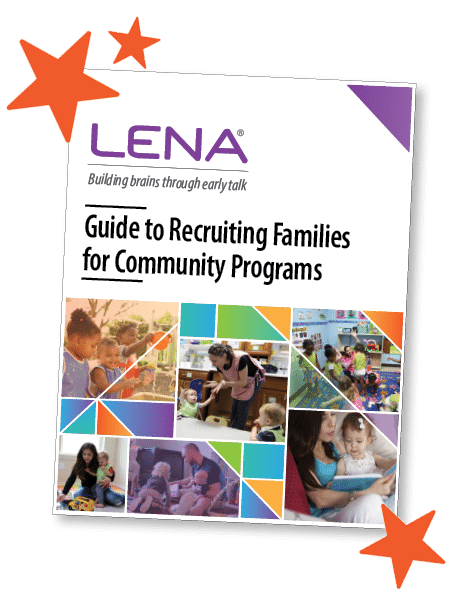Talking about family recruitment is something we’ve done plenty of in the past:
- We’ve written blog posts — like this one entitled “Five best practices for parent recruitment and retention (virtually or in person),” or this Q&A with Kai-ama Hamer of ParentCorps.
- We’ve hosted webinars, like this one entitled “Recruiting families for community programs,” which focused on school district and public library strategies.
- We’ve also made a downloadable guide to help streamline and boost our partners’ parent recruitment efforts, with a special section on recruiting for virtual programs.
It’s clear, though, that family recruitment is not something you can “set and forget.” It’s an ongoing process that needs consistent refinement and innovation.
A recent Community Conversation among LENA program partners made that idea crystal clear and inspired this post. We host Community Conversations to help encourage the sharing of ideas, challenges, solutions, and successes among our hundreds of partner organizations. It’s where Grow, Start, Home, and SP program implementers from around the world can gather to connect as a group and learn together in breakout sessions.
Our biggest takeaway from this recent Community Conversation: There’s always more to learn about effective family recruitment!
Recruiting families for community programs
Far from a one-time event, program recruitment is an ongoing effort. And far from universal, recruitment strategies are unique to each type of organization. If you're part of a team that provides programs for the community, how do you drum up excitement and spread the word?

Communicating “program positives” to prospective participants
It’s only natural to have questions, or even doubts, about participating in any program. Leading with the positives can make addressing those questions and doubts easier.
Course evaluations can be eye-opening
Like everything we do at LENA, our Start and Home programs for parents and caregivers are driven by data.
There’s the quantitative data, of course, which tells us how many conversational turns parents are having with their children. But there’s also the qualitative data from course evaluations, which can tell us so much about what motivates people to participate in LENA programs. Families are invited via text message to fill out a course evaluation the morning of their last session.
When we look at how parents describe why they signed up for LENA Start or LENA Home, three themes emerge:
- Parents and caregivers want to support their child’s development.
- They want to do everything they can to be a good parent.
- They are on the lookout for some kind of support from their community.
The course evaluation responses can clue you in to what parents value most. From there, you can brand your program accordingly. Because parents’ hopes for their children often share some commonalities, we should be highlighting those common themes to pique interest in enrolling in LENA.
Thinking about how we might incorporate the parent sentiments above into a recruitment pitch, we can come back to saying something as simple as this: “Parenting doesn’t come with a how-to manual. I for one have no idea whether I’m doing a good job. LENA Start will give you some actionable steps to support your child’s development, and at the same time you’ll be able to talk with other parents about what they’re trying and how that’s going.”
Program graduates as program ambassadors
Just as important as what’s being said is who’s saying it. Program managers may know the ins and outs of how Start and Home work, but no one can speak to the merits of a LENA program like a parent who has participated themselves.
Virginia Beach’s GrowSmart program, which recently conducted a thorough analysis of their parent recruitment efforts, found that most participants first learn about the program through the recommendation of a professional or peer in their community.
Consider collecting quotes from parents that you can include in promotional materials. Or think about recording a testimonial that you can play at an orientation or to use at other recruitment events. Project Launch Georgia did just that — and to great effect, having served 200 families in two years’ time.
Being responsive to recruitment barriers
Make no mistake about it: LENA programs are absolutely for everyone. That said, parents can be hesitant sometimes to participate — and understandably so. We’ve identified four primary reasons why parents may be skeptical when they first hear about LENA. Knowing that these four barriers may stand in your way is half the battle of recruitment!
The “language delay” misconception
Parents sometimes assume that LENA Start and LENA Home will only benefit them if their child has already been identified as experiencing a speech delay. In fact, though, every parent can benefit from LENA Start or LENA Home. And in turn, every child can benefit, too. Brain growth and social-emotional development are just two of the benefits of increased conversational turns that recent peer-reviewed research has identified. Those are things that stand to make every child’s future brighter.
Being clear about the program’s intended audience — all parents of children 0-3 years of age — can help prevent this misconception from limiting participation.
“I want a program for my child, not for me.”
Parents are always on the lookout for opportunities to help their children socialize with peers, especially in the time of COVID-19. For that reason, many parents are inclined to assume that LENA Start is a program designed for children, not for themselves. In a way, of course, it is designed for children, but only in the long run. In the short term, it’s designed for parents. Interactive talk must by definition involve the child, but learning strategies for increasing early talk starts with the parent.
Furthermore, LENA Start sessions absolutely do present opportunities for children to socialize, particularly if sites offer free child care during sessions or invite children to participate in interactive singing and dancing. In that way, the program is a win-win.
Some parents may assume that a program designed for parents automatically assumes the worst of them, that they’re doing something wrong. That couldn’t be farther from the truth. LENA’s programs meet parents where they are. We know parents want the best for their children, but we also know they may be overestimating just how much interactive talk they engage in. It’s not about addressing a deficiency. It’s about promoting an opportunity.
The time commitment
Parents may balk at committing to something that lasts 10 weeks. They may, however, be more willing to commit to something that requires just a one-hour commitment on a weekly basis. It’s all in how you craft the message.
Short of pressuring parents with a sense of urgency, it can also be effective to stress in promotional materials that the developmental period between birth and three years of age is both essential and brief. It’s a period that seems to fly by. The speed at which infants’ and toddler’s brains develop warrant a little bit of time commitment!
Parents may also be encouraged to hear that each session addresses a different strategy. The benefits are cumulative, yes, but they’ll also walk away with a wealth of information after just one hour.
“I can’t take on anything else during COVID”
COVID fatigue is related to the time commitment barrier, and it has made that barrier harder to get past than ever before. Between child care uncertainties and health and developmental concerns, parents may well be approaching their wit’s end. They’re rightfully concerned about the impact COVID may have on their children’s development, both in the short and long term. They’re looking for solutions and opportunities, not hindrances and burdens.
The pandemic motivated LENA to pivot to virtual and hybrid program delivery, aiming to increase convenience and safety without sacrificing the sense of community. Promoting that pivot as a net positive is important for family recruitment. At a time when parents have to weigh new time commitments very carefully, it’s also important to reiterate that LENA Start or LENA Home may well be the perfect program for parents right now. The strategies these programs deliver are done so conveniently, and they can only help keep children on track developmentally during these unprecedented times.







